|

|
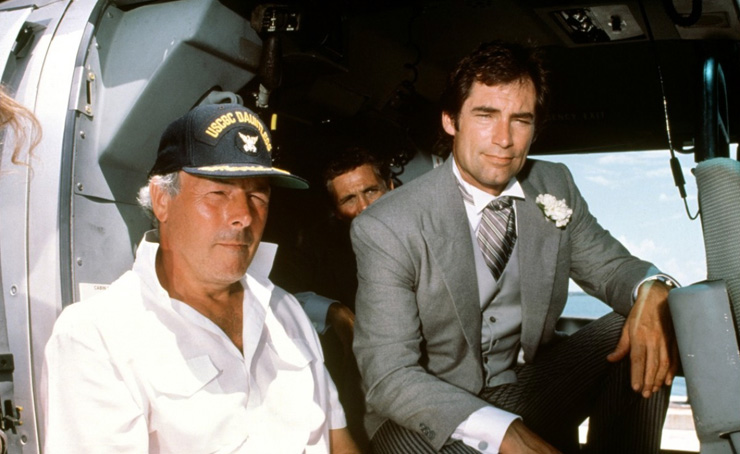 |
|
Parachuting? Did you
do any of the parachute stuff?
(smiles) Well, we donít talk about that. I think itís safe to say now I
wonít tell anybody about how the stunts are done, how effects are made,
because thatís all part of the enjoyment. You remember, as I do, when we
were all a lot younger and watching Dr. No for the first time and
how you were on the edge of your seat when the tarantula crawls up his
chest Ė if you knew there was a piece of glass between him and the
tarantula, the moments blown!
But you did some
actual scuba work?
Yes, I did learn to scuba dive. Itís important. I am involved in all the
action. I am involved in every single, whatever you want to call it,
action sequence or stunt sequence, I am involved in it all. Because itís
an action-thriller. Youíve got to know that Bond is there! Youíve got to
be with Bond in his moments of danger. Otherwise youíre conning the
audience. And youíve got to be able to get a camera in there. So I get
involved in everything. That isnít to say that there arenít stuntmen. But
nobody does anything dangerous Ė the skill is to make it appear dangerous.
But I did get out of the helicopter on the wire.
Unlike some of the other actors who have played Bond, like a true
theatre craftsman, I can really sense that youíre searching for and using
the subtext. For example, your reading of the line Ďshaken not stirredí
was so freshÖ
Oh thatís right, he uses it as a put down to her.
I mean, we know youíre
ordering a drink, but the subtext is Ďget out of here, I want to be alone
with this womaní. Does the director, John Glen, work with the actors at
all in Ďbringing out the subtextí, or is that your own work?
Itís a collaborative effort. I mean, in the movies the director must be
the most harassed, under pressure man on the entire set. He doesnít want
to be telling people how to do their jobs, heís got to be responsible for
the movie and for getting it organised and shooting it and making his
movie. He doesnít want to be telling the lighting cameraman how to light
it, you know, he wants people to come to him with ideas to choose from,
with alternatives, with input. |
|
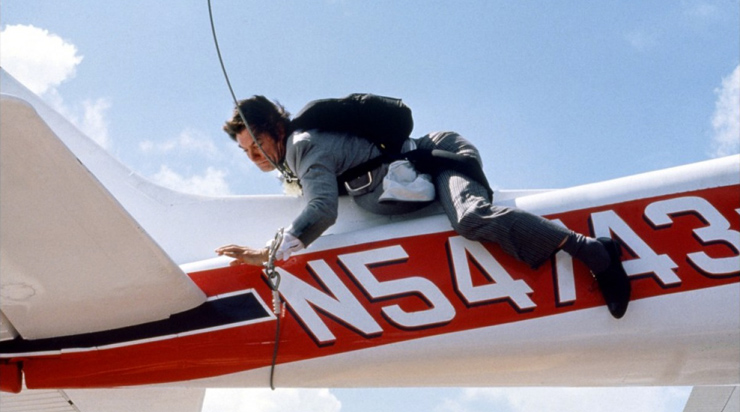 |
|
Do you get any
rehearsal time?
We get a bit, but you donít rehearse films much.
Do you wish you had more rehearsal time?
Well, sometimes and sometimes not. It depends on the nature of the scene.
But what we will generally do, as on any film, is something that Iíve
always insisted on Ė I mean, I havenít had to insist on it, itís just the
way one should work Ė you take the scene and you work the scene Ė maybe
briefly, maybe quickly, but youíll explore the scene and then you do it
bit by bit. You have to know where youíre going, you have to know whatís
what. But real rehearsal, no thereís not a lot, and sometimes, it depends
on the actor, the spontaneity, as long as you know what the scene is
about, as long as you know what youíve got to achieve in the scene, as
long as you understand its physicality, itís sometimes good not to
rehearse because providing the aim is in your head, the spontaneity is
important in itself. In theatre what you always notice is that sometimes
first rehearsals are marvellous, but then you always get stale after a
while; but then after a further while as a result of the exploration
youíve done, as a result of the conclusions youíve come to, it starts to
come fresh again. But you do go through that stale patch. That mustnít
happen on film Ė youíve got to capture moments of truth, aliveness, and
spontaneity.
Do you think Bond could work on stage? If the opportunity arose, would
you be interested in playing James Bond in a stage play, if it was done
the right way?
I couldnít really see it being done on stage. I mean its very essence is
not introspective.
Something low key like CASINO ROYALE?
Well, CASINO ROYALE, other people have the rights of course, but to make a
film like CASINO ROYALE properly, it would be so outside what is currently
accepted as James Bond on film, but it would make a bloody good film. Done
as written, it would make a great film. |
|
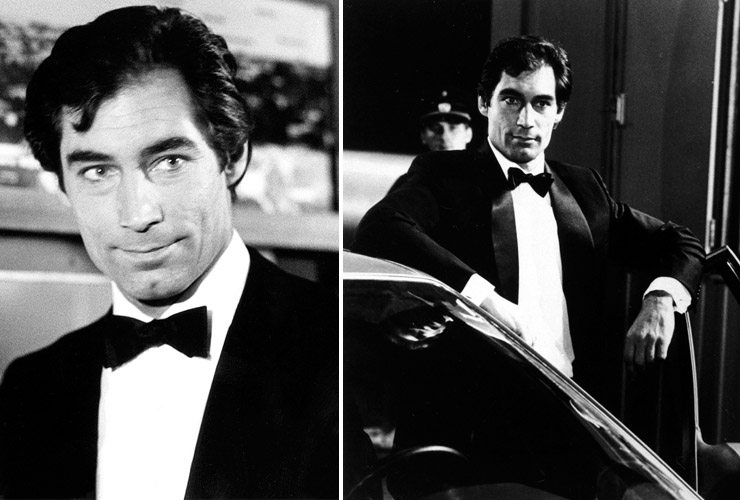 |
|
I see it black and
white, 1953Ö
Done as a period piece, yes, Iíd love to do that film, but other people
have the rights, and it would be so far outside what people would expect
of James Bond, who knows how it would be received Ė but itís a cracking
good story. But on the theatre, I couldnít imagine a James Bond story in
the theatre.
How has playing James Bond changed your life, positively and
negatively?
Hardly at all negatively Ė Iím very happy to say that. Positively Ė
professionally, of course, because the nature of our world is a commercial
world and if you can have a commercial success then youíll get a lot more
offers.
What about the legions of fans whoíll hound you for autographs for the
rest of your life?
Well, thatís all bollocks, isnít it? Itís all bullshit. That is not true.
You get all that when youíre in a publicity situation. There might be a
few people outside the hotel, but those are the professional autograph
bounty hunters, or the paparazzi. But you or I could walk down the street
here or in London, and people would certainly recognise me, but nobody is
going to bother me. Most people on the street are healthy, decent people
with their own sense of self-respect and integrity and theyíll treat you
regularly if you behave regularly. If on the other hand you behave like an
asshole, and go around with battalions of bodyguards and limousines and
press and photographers and all that, and make an issue out of it, then
itís a different story. The majority of people who go and see a movie or
play, if they like it, they come out and say that was a bloody good film
or play, and so on, but theyíre not going to go around to the stage door;
theyíre not going to write and ask for an autograph. Only a tiny
percentage of them will. And the bulk of that percentage are people who
really just want to say that was great and would you mind if I had an
autograph. The kind of thing youíre talking about is the tiniest minority,
and itís a bit odd anyway. |
|
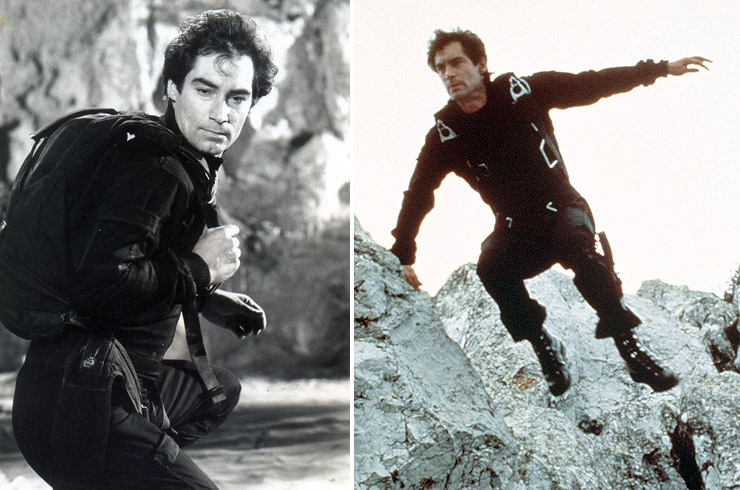 |
|
The Bond world has
that group, you know, like Star Trek and Batman Ė itís got
its legion of fans. Itís going to last.
Frankly, I love it from some. Someone in the airport the other day just
said, ĎI saw the film Ė terrific Ė thanksí, and walked on. That felt
great. Thatís how I would react, thatís how you would react, if you see a
performance you love, and if you ever met the guy, maybe Ė but even if you
did, even if you were in a restaurant you might not want to disturb him
having his dinner, youíd just think ĎOh, thereís...í. But some people make
a profession of being a fan. Itís on the edge of abnormality in a lot of
ways. Itís gone beyond genuine care and respect. And thereís not many of
them. The press tend to build up all the screaming hoards. Sure, if you go
to a premiere itís par for the course, itís everybodyís game. New rules
are set. But just going down the street to the pub, the real world is not
a problem.
So you donít get much of that?
And Iím very pleased. As an actor you canít cut yourself off from your
roots; you canít cut yourself off from the foundations of your work, and
they are people - itís people who you act, itís people you take parts in
stories, life is about people. If youíre stuck up on some hill surrounded
by barbed wire and guards Ė how could you be in our business if you remove
yourself from our world?
What was your first
initiation into Bond Ė the books or the early films?
It was the film Dr. No. |
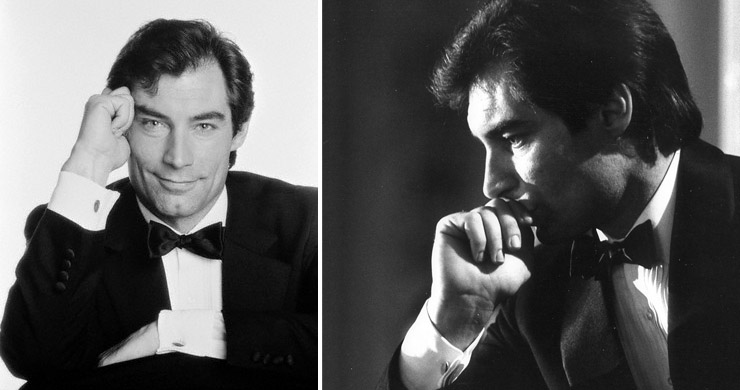 |
|
Can you remember what
really struck you about that?
Well, I donít remember how old I was, 15 or 16 Ė 1962, I must have been 15
when it came out. And it was splendid, if you think about how things were
at that time; I donít know about America, but what kind of movies were you
watching? War stories, drawing room comedies out of the fifties, and this
film Dr. No just came and took the cinema by the scruff of the neck and
banged it right down into today. As well as giving us a whole new area of
adventure story to explore. And it was terrific. And then they went on.
The miracle is that theyíre still as popular as they ever were. That is in
great part due to the essence of the stories, because they are hero
stories, and hero stories have crossed all cultures, all history; people
need heroes. But theyíve always been done bloody well. Mr Broccoliís never
attempted to cheaply exploit a previous success. Heís always tried to make
sure that every single film is done better than the one before or
absolutely as best as it can be. The money spent, the talent...
Objectively how do you think you compare to other Bonds?
I donít think about it. Itís a futile exercise. It becomes so complex.
Itís true that Iím acting in a public sense, and I would include myself in
that, that over 27 years of Bond movies, everyone has their own idea of
what a Bond movie is. The fact that every single movie is tremendously
different from the other. I mean how can you look at a film like From
Russia With Love, a Bond film and compare it with Moonraker?
Itís such a different story and itís such a different style. Connery was
in a certain kind of movie and even the style of those movies began to
alter. The first movies, if you look at them now, they have a different
effect than they had when we watched them originally. Theyíre of their
time, but they were in general wonderful adventure thrillers. The Moore
movies were light-hearted and tongue in cheek technological extravaganzas.
You canít compare Moore and Connery because they were in such different
films. I leave it for other people to make comparisons. The other
interesting thing is, of course, and the problem we all face, is that if
nobody had ever heard of a James Bond movie, if there had been no James
Bond movies ever, and The Living Daylights or Licence To Kill
or any of the movies was just released as a movie in its own right, the
public opinion and appreciation and reaction would be completely
different! Itís because one is carrying all this history. Itís like going
out and playing Hamlet. How can anybody do Hamlet these days? Everyone
knows the bloody story, nobodyís surprised. Nobodyís been taken by
spontaneous reaction. |
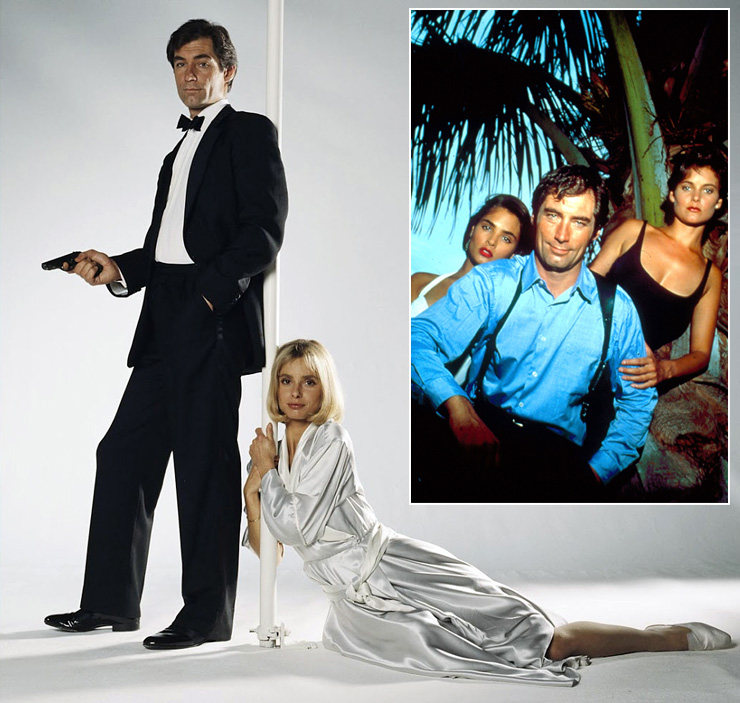 |
|
Given that Bond is
something of a role model for young people...
A role model?
Sure, when I was a kid and saw Goldfinger, I was buying all the
toys and running around with my eyebrows raised and all that...
Connery didnít raise his eyebrow! (laughs)
Do you think Bond should de-emphasise any of his traits? Do you think
you have a responsibility as an actor to...
I donít think that Bond is a role model or that he should be a role model.
Heís only part of a particular kind of story. I donít think anyone should
grow up wanting to go around killing people. I donít think anyone should
grow up wanting to be a secret agent...
I did! (laughs)
Well, weíre in a different world now arenít we? In those days we all had a
sense of intrigue and mystery and a sense of justice and rightness about
our countries. In this day and age, I donít think people have too much
regard for the work of their own secret services, do they? I think itís
certainly well worth believing in some kind of truth and justice. But Bond
is not a paragon of virtue; heís a man riddled with vices and weaknesses
as well as strength. But that is the nature of the man, and the nature of
the world he lives in, but I donít think he should be a role model.
Do you think he should practice safe sex on screen?
I donít think weíve ever seen sex in a Bond movie. |
|
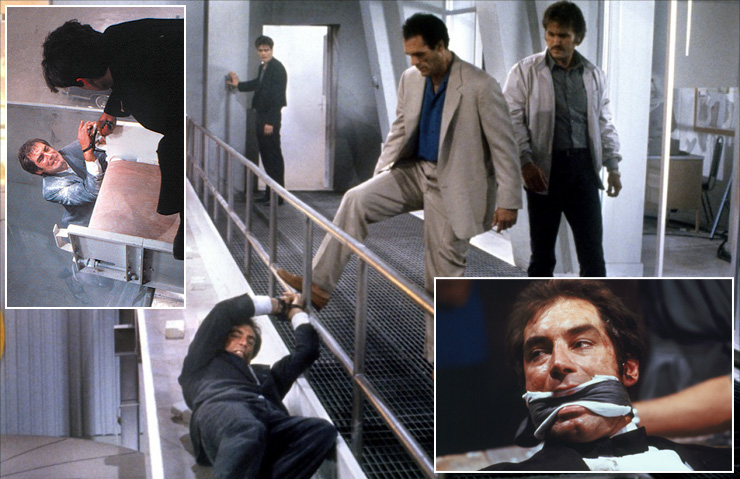 |
|
Licence To Kill
is probably the most violent Bond film ever made. Do you have any comment
on that. What would you say to critics who might attack the film for being
too violent?
I wouldnít say anything to the critics Ė they have every right to their
opinion. I donít know that it is the most violent Bond film, because you
must judge it in terms of its time. Donít forget that Dr. No
created an outrage, not only for its violence, but for its sex. But
thereís no sex in Dr. No at all, so what were they talking about.
What they were actually talking about in í62, although we think of the
sixties Ė the sixties didnít really begin until the mid-sixties, í62 was
still the fifties Ė what they were talking about was Ursula Andress coming
out of the waves in a bikini! It was the first time weíd seen a bikini!
That was an outrage sexually! As for the violence Ė it was given an ĎAí
certificate (in Britain this classification meant you had to be
accompanied by an adult to see the film) because Bond gunned down an
unarmed, defenceless man, you know - ĎYouíve had your sixí, now that for
its day was considered a) wrong, morally wrong and b) very violent. Now
everything in our movie, first of all Iím pleased that our movie is more
violent, because that is the world that James Bond must live in, and if
you donít like that, Iím sorry, donít go and see the film. Weíre not
making movies for kids; weíre making movies for adults Ė itís an adult
fantasy that kids will enjoy. Yes I agree that kids can see this, and they
should go and see it, but weíre not making the film for 11 year olds!
Weíre making the film for the child in all of us adults. It is a violent
world he inhabits Ė itís the very nature of a Bond movie. But whether itís
more or less violent is relatively speaking; I mean everything is classic,
isnít it? I mean, people getting fed to the sharks, to the piranha fish,
people getting set on fire, people being shot with harpoon guns, people
being shot with bullets, Bond killing people Ė theyíre all classic
elements of the genre! In a modern world you do them to the height of your
skills, and is it violent? Yes, it is violent, but you donít see the
violence. What the film makers do, which is brilliant is they create the
tension, the extreme tension of violence. The violence is all in the mind.
If Ian Fleming was still alive today and you had some influence on how
he was going to take the character in a certain direction, would you have
anything you would say to him? Where would you like to see Bond go or
happen to him?
Well, if Ian Fleming was alive today, Iíd love to spend time talking with
him about the character, and Iíd love him to be involved in making the
film, as Iím sure everyone in our organisation would be. But I think Iíd
leave the creative ideas to him.
Where do you think 007ís future lies as far as the nineties are
concerned?
I donít know. Itís always important to remember that he doesnít really
operate as a spy or a member of the secret service. At the end of CASINO
ROYALE, Fleming did make him a hero, the man who does it virtually alone.
And that theme is universal Ė the hero theme, no matter what sort of hero
youíve got, a white knight, or a man of many paradoxes, youíve just got to
make sure the stories have some modern relevance, and they mean something
to a modern audience, and then rely on creativity and imagination to
create those stories. |
|
|
|
|


